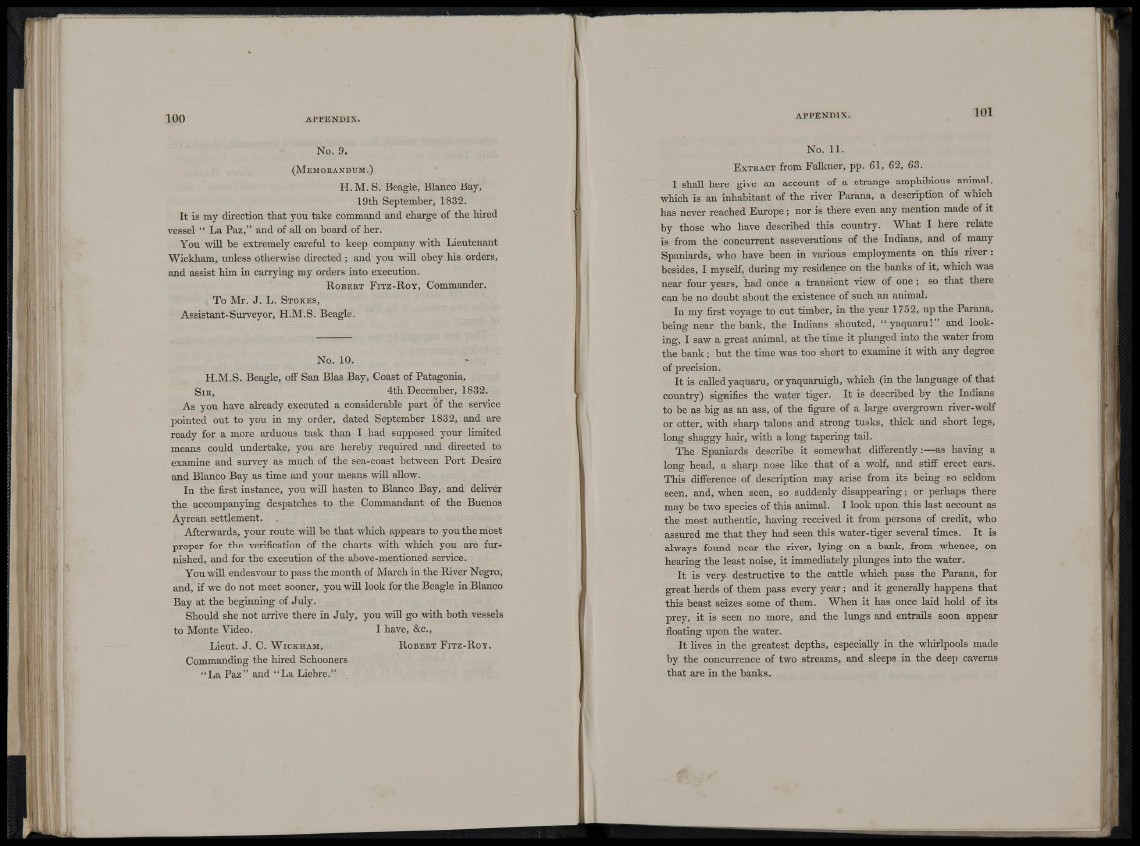
100 A l ' P E N D l X .
No. 9.
(MEMOHANDUM.)
H. M. S. Beagle, Blanco Bay,
19th September, 1832.
It is my direction that you take command and charge of the hired
vessel " La Paz," and of all on board of her.
You will be extremely careful to keep company with Lieutenant
Wickham, unless otherwise directed ; and you -will obey his orders,
and assist him in carrying my orders into execution.
ROBERT FITZ-ROY, Commander.
T o Mr . J . L. STOKES,
Assistant-Surveyor, H.M.S. Beagle.
NO. 10.
H.M.S. Beagle, off San Bias Bay, Coast of Patagonia,
SiK, 4th December, 1832.
As you have already executed a considerable part of the service
pointed out to you in my order, dated September 1832, and are
ready for a more arduous task than I had supposed your limited
means could undertake, you are hereby required and directed to
examine and survey as much of the sea-coast between Port Desire
and Blanco Bay as time and your means wiU allow.
In the first instance, you wUl hasten to Blanco Bay, and deliver
the accompanying despatches to the Commandant of the Buenos
Ayreau settlement.
Afterwards, your route ^TU be that which appears to you the most
proper for the verification of the charts with which you are furnished,
and for the execution of the above-mentioned service.
You win endeavour to pass the month of March in the River Negro,
and, if we do not meet sooner, you wiU look for the Beagle in Blanco
Bay at the beginning of July.
Should she not arrive there in July, you wUl go with both vessels
to Monte Video. I have, &c.,
Lieut. J. C. WICKHAM, ROBERT FiTz-Roi.
Commanding the hired Schooners
"La Paz" and "La Liebre." ,
A P P E N D I X , 101
No. 11.
EXTRACT from FaUiner, pp. 61, 62, 63.
I shall here give an account of a strange amphibious animal,
which is an inhabitant of the river Parana, a description of which
has never reached Europe; nor is there even any mention made of it
by those who have described this country. What I here relate
is from the concurrent asseverations of the Indians, and of many
Spaniards, who have been in various employments on this river :
besides, I myself, during my residence on the banks of it, which was
near four years, had once a transient view of one ; so that there
can be no doubt about the existence of such an animal.
In my first voyage to cut timber, in the year 1752, up the Parana,
being near the bank, the Indians shouted, "yaquaru!" and looking,
I saw a great animal, at the time it plunged into the water from
the bank ; but the time was too short to examine it with any degree
of precision.
It is caUed yaquaru, or yaquaruigh, which (in the language of that
country) signifies the water tiger. It is described by the Indians
to be as big as an ass, of the figure of a large overgrown river-wolf
or otter, with sharp talons and strong tusks, thick and short legs,
long shaggy hair, with a long tapering taU.
The Spaniards describe it somewhat differently:—as having a
long head, a sharp nose like that of a wolf, and stiff erect ears.
This difference of description may arise from its being so seldom
seen, and, when seen, so suddenly disappearing; or perhaps there
may be two species of this animal. I look upon this last account as
the most authentic, having received it from persons of credit, who
assured me that they had seen this water-tiger several times. It is
always found near the river, lying on a bank, from whence, on
hearing the least noise, it immediately plunges into the water.
It is very destructive to the cattle which pass the Parana, for
great herds of them pass every year; and it generally happens that
this beast seizes some of them. When it has once laid hold of its
prey, it is seen no more, and the lungs and entrails soon appear
floating upon the water.
It lives in the greatest depths, especially in the whirlpools made
by the concurrence of two streams, and sleeps in the deep caverns
that are in the banks.
li
li